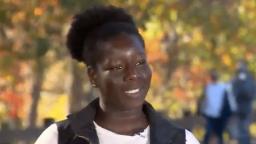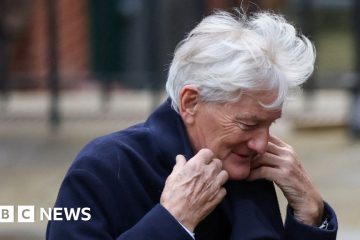
So many veterans and service members are struggling with the invisible wounds of war. One Navy veteran is lacing up to let others know there is light at the end of the tunnel.“I’ve never been like, ‘Yeah. Let’s go for a run,’’’ said Navy veteran Yuma Haidara. “It was almost forced on me. I played a lot of sports in high school, and in joining the military, you just have to run.” Running started as a convenient way to stay fit. “I told myself I need to get moving, again, and the easiest way to do that was by buying a pair of running shoes,” she said. But running turned into much more when Haidara was selected through a lottery to run the Chicago Marathon — her first 26.2-mile race ever.“I was like, ‘I guess I’m training for a marathon.’ Because when you get picked, it charges you. So, it’s not like you can be like, ‘Nevermind,’” she said. One marathon turned into another, and in 2021, the New York City Marathon was knocking, but that race was different as Haidara was running for one of her own.“To know that, like, he was struggling so much, and he couldn’t find the help he needed, was tough,” Haidara said. She lost her best friend, who she served with, to suicide. He wasn’t the first from her unit.“In my battalion, for whatever reason, we have a very high number of suicide rates. None of us can figure it out. We just say we’re cursed. Kind of like a dark humor joke,” Haidara said. When Haidara was approached to run the marathon to raise money for Home Base veterans, she gladly stepped up.“It meant a lot for me the be able to run for him. But I also just wish he knew that there was a program like Home Base that he would have access to,” Haidara said. But Haidara was struggling, too, and had been for a while.“I found myself not enjoying life anymore,” she said. The night before the marathon, she shared those struggles with others on the Home Base team — who immediately provided support, resources and help.“It made it OK not to be OK in that moment,” she said. “Home Base saved my life because they were the first step in my healing.”Now, Haidara is stepping into her stride and preparing to run the Boston Marathon with Home Base veterans. “The more funds we get, the more veterans we can help, and there’s a lot of veterans in this country suffering,” Haidara said. “So for me, it’s all about giving back and making sure everyone knows it’s OK not to be OK.”
So many veterans and service members are struggling with the invisible wounds of war. One Navy veteran is lacing up to let others know there is light at the end of the tunnel.
“I’ve never been like, ‘Yeah. Let’s go for a run,’’’ said Navy veteran Yuma Haidara. “It was almost forced on me. I played a lot of sports in high school, and in joining the military, you just have to run.”
Running started as a convenient way to stay fit.
“I told myself I need to get moving, again, and the easiest way to do that was by buying a pair of running shoes,” she said.
But running turned into much more when Haidara was selected through a lottery to run the Chicago Marathon — her first 26.2-mile race ever.
“I was like, ‘I guess I’m training for a marathon.’ Because when you get picked, it charges you. So, it’s not like you can be like, ‘Nevermind,’” she said.
One marathon turned into another, and in 2021, the New York City Marathon was knocking, but that race was different as Haidara was running for one of her own.
“To know that, like, he was struggling so much, and he couldn’t find the help he needed, was tough,” Haidara said.
She lost her best friend, who she served with, to suicide. He wasn’t the first from her unit.
“In my battalion, for whatever reason, we have a very high number of suicide rates. None of us can figure it out. We just say we’re cursed. Kind of like a dark humor joke,” Haidara said.
When Haidara was approached to run the marathon to raise money for Home Base veterans, she gladly stepped up.
“It meant a lot for me the be able to run for him. But I also just wish he knew that there was a program like Home Base that he would have access to,” Haidara said.
But Haidara was struggling, too, and had been for a while.
“I found myself not enjoying life anymore,” she said.
The night before the marathon, she shared those struggles with others on the Home Base team — who immediately provided support, resources and help.
“It made it OK not to be OK in that moment,” she said. “Home Base saved my life because they were the first step in my healing.”
Now, Haidara is stepping into her stride and preparing to run the Boston Marathon with Home Base veterans.
“The more funds we get, the more veterans we can help, and there’s a lot of veterans in this country suffering,” Haidara said. “So for me, it’s all about giving back and making sure everyone knows it’s OK not to be OK.”
Note:- (Not all news on the site expresses the point of view of the site, but we transmit this news automatically and translate it through programmatic technology on the site and not from a human editor. The content is auto-generated from a syndicated feed.))



